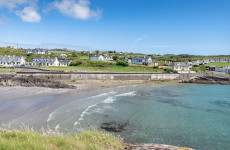Top Stories
Major Drug Bust: €58M Cocaine Scheme Unraveled in West Cork

UPDATE: A major drug operation has been disrupted in West Cork, where an international gang attempted to import €58 million worth of cocaine using sophisticated tactics, including anti-bugging devices and a stealth speedboat. The details emerged today from the Special Criminal Court, revealing how the gang’s plan quickly unraveled.
Authorities confirmed that the gang, comprised of Spanish, Dutch/Iranian, Serbian, and Irish nationals, was apprehended after failing to rendezvous with a “mothership” off the coast of Cornwall. They returned empty-handed to Tragumna Pier, where local residents alerted Gardaí about suspicious activities involving a high-powered Rigid Hulled Inflatable Boat (RHIB).
The operation began to collapse when two suspects were stopped at a Garda checkpoint in Bandon late at night. Their nervous demeanor raised suspicions, prompting a search that uncovered a list of locations and GPS coordinates tied to their drug trafficking operation. Inspector Joseph Young revealed this critical information during the court proceedings.
As the investigation progressed, authorities received a call from a concerned local resident who witnessed men attempting to load the RHIB onto a truck at Tragumna Pier. This led to the arrest of ten suspects, including Kiumaars Ghabiri, Mario Angel Del Rio Sanz, and Anuar Rahui Chairi, all of whom have pleaded guilty. They face charges under Section 15A of the Misuse of Drugs Act for attempting to possess drugs worth over €13,000.
The gang’s intricate plan involved using the stealth RHIB to intercept the Cool Explorer, a refrigerated vessel that had departed from Ecuador in early February 2024. Loaded with legitimate cargo, it was also carrying approximately 840 kilos of cocaine, which is now estimated to be worth €59 million. The ship was scheduled to arrive in St. Petersburg, Russia, on March 17, 2024, but the gang missed the critical drop-off point.
Following the arrests, Gardaí discovered that one vehicle used by the gang had false plates and was reported stolen in Glasgow. Additionally, extensive searches revealed a trove of nautical equipment linked to the operation, including dry suits, satellite phones, and over 30 mobile phones.
The investigation has garnered attention due to the scale and sophistication of the operation. Gardaí have confirmed that the gang’s RHIB was designed to evade detection at sea, equipped with powerful engines and modified radar systems. According to former Naval Service officer Gary Delaney, the boat was “for the purpose of detecting but not being detected.”
As the hearing continues, officials are working to piece together the full extent of the gang’s network. Three other suspects have pleaded not guilty, and their trials are expected to begin in the coming weeks. Authorities urge the public to remain vigilant and report any suspicious activities, as efforts to combat organized crime intensify.
Stay tuned for further updates on this developing story as Inspector Young resumes his testimony tomorrow morning.
-

 Top Stories2 months ago
Top Stories2 months agoTributes Surge for 9-Year-Old Leon Briody After Cancer Battle
-

 Entertainment3 months ago
Entertainment3 months agoAimee Osbourne Joins Family for Emotional Tribute to Ozzy
-

 Politics3 months ago
Politics3 months agoDanny Healy-Rae Considers Complaint After Altercation with Garda
-

 Top Stories3 months ago
Top Stories3 months agoIreland Enjoys Summer Heat as Hurricane Erin Approaches Atlantic
-

 World4 months ago
World4 months agoHawaii Commemorates 80 Years Since Hiroshima Bombing with Ceremony
-

 Top Stories2 months ago
Top Stories2 months agoNewcastle West Woman Patricia Foley Found Safe After Urgent Search
-

 Top Stories4 months ago
Top Stories4 months agoFianna Fáil TDs Urgently Consider Maire Geoghegan-Quinn for Presidency
-

 World4 months ago
World4 months agoGaza Aid Distribution Tragedy: 20 Killed Amid Ongoing Violence
-

 World4 months ago
World4 months agoCouple Convicted of Murdering Two-Year-Old Grandson in Wales
-

 Top Stories3 months ago
Top Stories3 months agoClimbing Errigal: A Must-Do Summer Adventure in Donegal
-

 World4 months ago
World4 months agoAristocrat Constance Marten and Partner Convicted of Infant Murder
-

 Top Stories3 months ago
Top Stories3 months agoHike Donegal’s Errigal Mountain NOW for Unforgettable Summer Views









